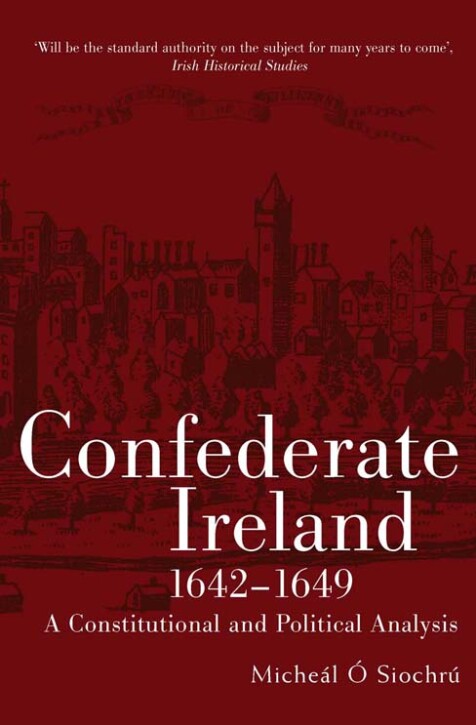Confederate Ireland, 1642–1649
A constitutional and political analysis
Micheál Ó Siochrú
‘This incredibly important, and indeed monumental work, has the added value of the magisterial Foreword by no less an authority than Professor John Morrill … Mícheál Ó Siochrú has achieved, with his amazingly well-researched narrative, the fullest possible treatment of his subject, with a complete mastery of detail’, Stelios Rigopoulos, Royal Stuart Society Journal (2016).
'Confederate Ireland 1642-1649: a constitutional and political analysis has been republished in paperback. The judgement of Irish Historical Studies – that 'it will be the standard authority on the subject for many years to come” – has, like the book itself, stood the test of time', History Ireland (January/February 2009).
‘Ó Siochrú, a specialist in 17th-century Ireland, contributes to the growing interest in the rebellion in Ireland during the 1640s, which historians have long skipped over with a bare glance, or have mentioned merely as a footnote to the concurrent civil war in England, and indeed ferment throughout Europe. He focuses on the politics, discussing the formation of the government in 1642, peace talks, outside intervention, compromise, war and peace, and other matters’, Book News (May 2009).
‘Through his meticulous research and expert evaluation of original documents, contemporary accounts and drawing upon some unpublished theses, Ó Siochrú is certainly one of the most important post-revisionist historians in Ireland today. Without reading Ó Siochrú’s brilliant account of the period, no full appreciation of the political sophistication, reform mindedness and administrative competence of seventeenth century Confederate Ireland is possible', Michael Merrigan, Cumann Geinealais na hÉireann – Ireland’s Genealogical Gazette (December 2008).
‘Confederate Ireland does not pull any punches … it makes a very strong case for saying that 1641 was “the fulcrum of Irish history, the point of balance between the long history of English power resisted and English power imposed and, inexorably, over decades and centuries, subverted” and proves that “any book that makes sense of 1641 and its aftermath is simply central to the understanding of that process.” John Morrill, Professor of British and Irish History in the University of Cambridge, made this declaration and added that Confederate Ireland was one such book', J. Ardle McArdle, Books Ireland (February 2010).
‘In his foreword to the paperback version of Confederate Ireland, John Morrill … implicitly suggests that the original research and the convincing narrative are compelling reasons to assign the work for courses on early modern Ireland … the final chapter on Confederate government is a brilliant example of political analysis that sums up the way ward drift of the infant polity, ending in its final demise, undone not by Cromwellian force but by its own internal contradictions. There are riveting stories and surprising, frustrating anecdotes that enliven the text … for students of revolution, therefore, and for students of early modern British history, this is a persuasive work of original thought and a constructive re-imagining of this critical period', Jon G. Crawford, Sixteenth Century Journal (Summer 2010).

